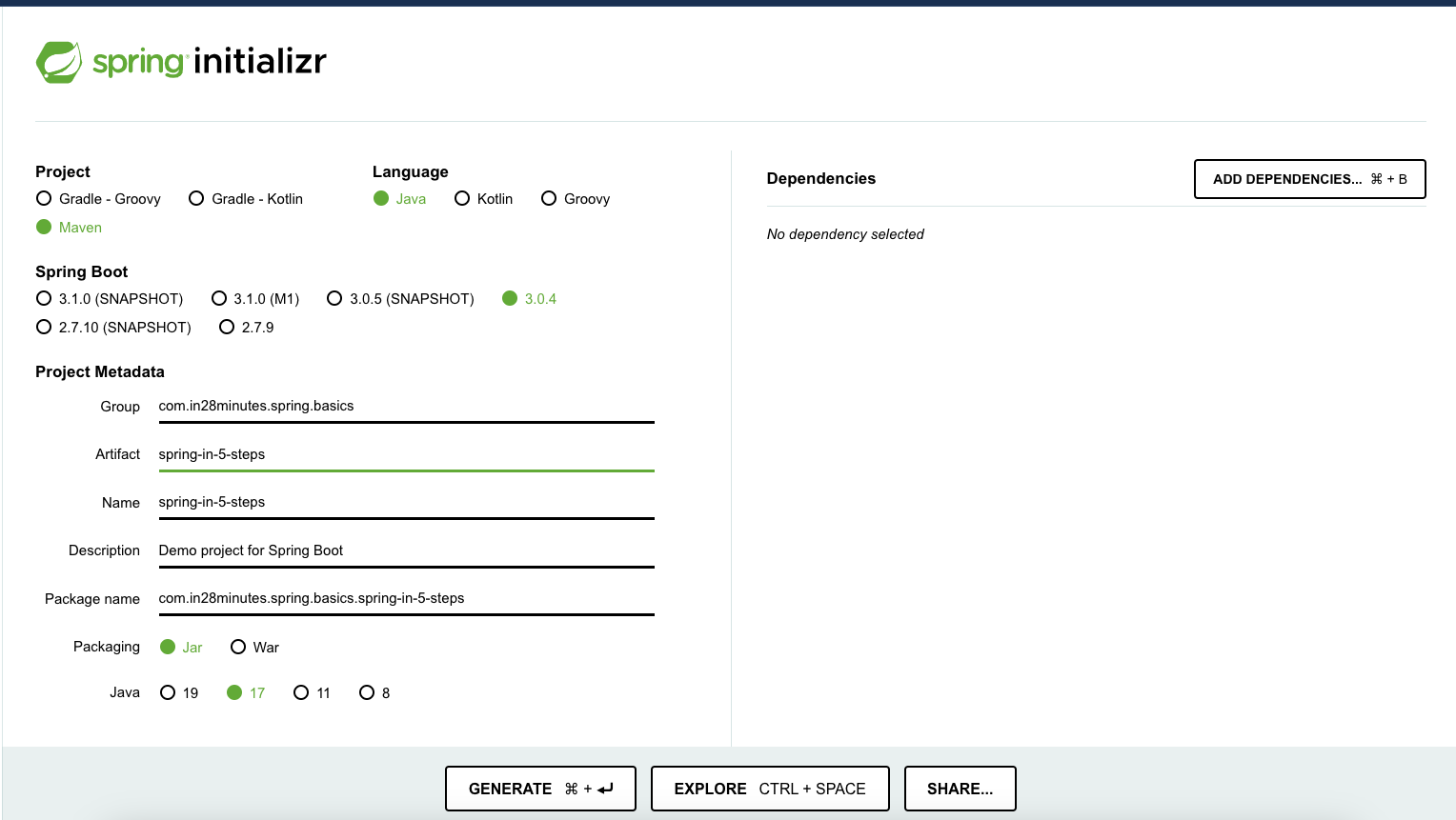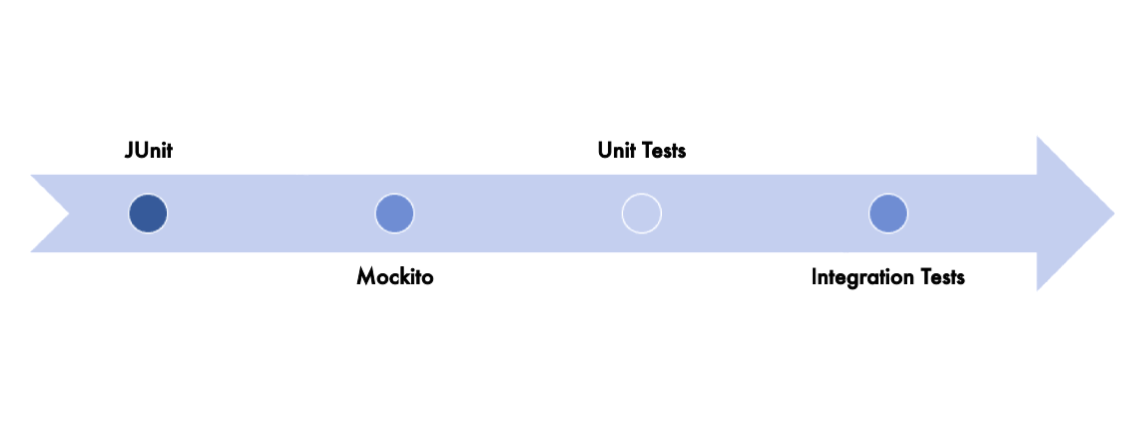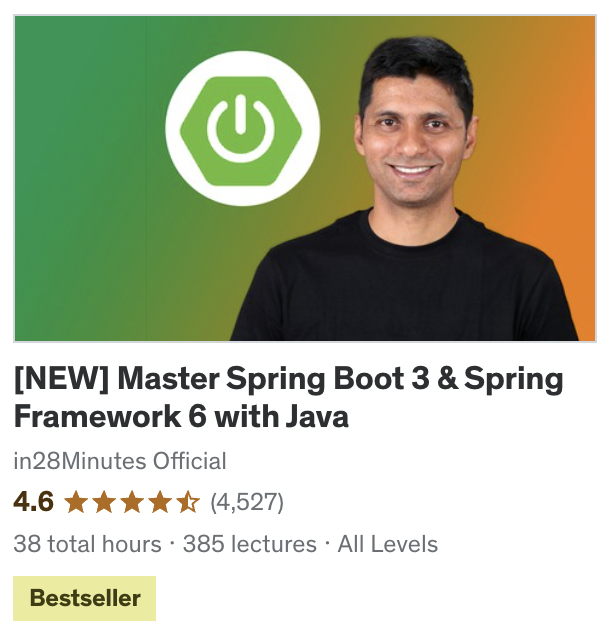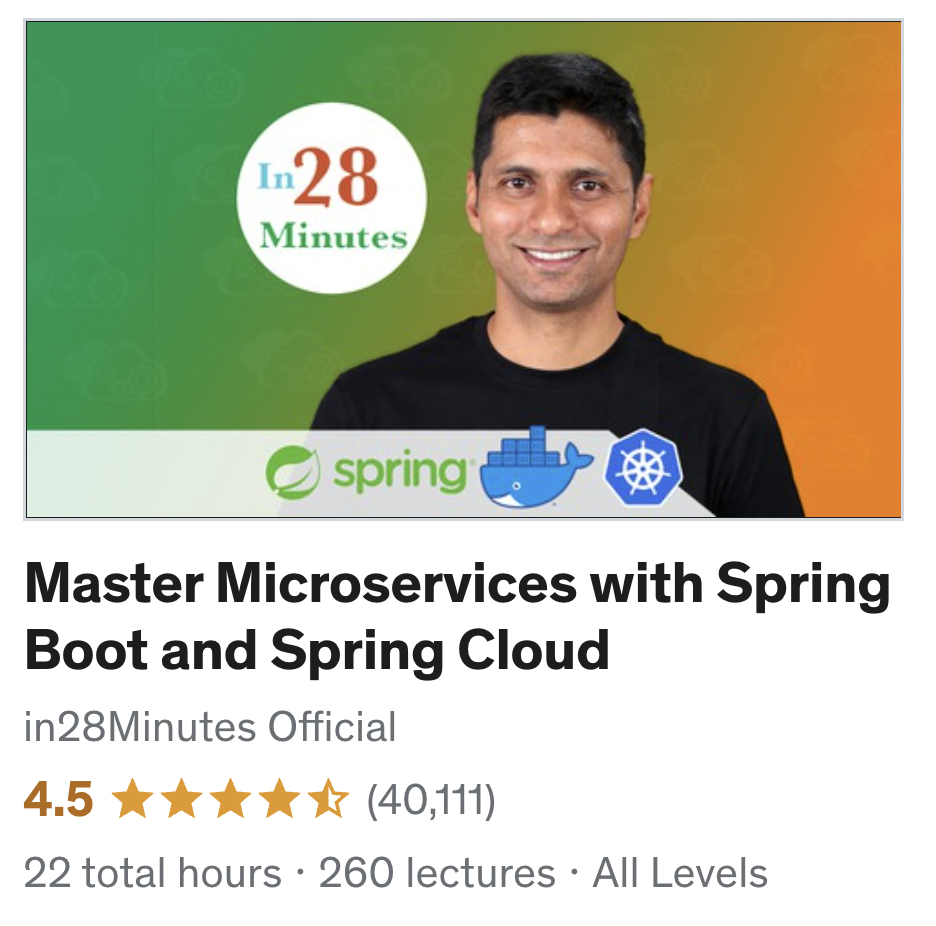Mockito is the most popular Java mocking framework.
Git Repository
- https://github.com/in28minutes/getting-started-in-5-steps/tree/master/mockito-in-5-steps
Pre-requisites
- Java & Eclipse - https://www.youtube.com/playlist?list=PLBBog2r6uMCSmMVTW_QmDLyASBvovyAO3
- JUnit - https://courses.in28minutes.com/p/junit-tutorial-for-beginners
IDE Configuration
Easier Static Imports
- Window > Preferences > Java > Editor > Content Assist > Favorites
- org.junit.Assert
- org.mockito.BDDMockito
- org.mockito.Mockito
- org.hamcrest.Matchers
- org.hamcrest.CoreMatchers
Reference
- Visit Mockito Official Documentation - http://site.mockito.org/mockito/docs/current/org/mockito/Mockito.html
Overview
- Step 1 : Setting up an example using http://start.spring.io.
- Step 2 : Using a Stubs - Disadvantages
- Step 3 : Your first mock.
- Step 4 : Using Mockito Annotations - @Mock, @InjectMocks, @RunWith(MockitoJUnitRunner.class)
- Step 5 : Mocking List interface
Step 1 : Setting up an example using http://start.spring.io.
Creating a Spring Project with Spring Initializr is a cake walk.
Spring Initializr http://start.spring.io/ is great tool to bootstrap your Spring Boot projects.

As shown in the image above, following steps have to be done
- Launch Spring Initializr and choose the following
- Choose
com.in28minutes.mockitoas Group - Choose
mockito-demoas Artifact - Choose Dependency
- Web
- Choose
- Click Generate Project.
- Import the project into Eclipse.
- If you want to understand all the files that are part of this project, you can go here.
Let’s also set up a simple business class with a dependency.
- SomeBusinessImpl depends on DataService for the data
- findTheGreatestFromAllData has some business logic to find the greatest
package com.in28minutes.mockito.mockitodemo;
public class SomeBusinessImpl {
private DataService dataService;
public SomeBusinessImpl(DataService dataService) {
super();
this.dataService = dataService;
}
int findTheGreatestFromAllData() {
int[] data = dataService.retrieveAllData();
int greatest = Integer.MIN_VALUE;
for (int value : data) {
if (value > greatest) {
greatest = value;
}
}
return greatest;
}
}
package com.in28minutes.mockito.mockitodemo;
public interface DataService {
int[] retrieveAllData();
}
Step 2 : Using a Stubs - Disadvantages
Let’s construct a unit test for SomeBusinessImpl using a stub.
package com.in28minutes.mockito.mockitodemo;
import static org.junit.Assert.assertEquals;
import org.junit.Test;
public class SomeBusinessStubTest {
@Test
public void testFindTheGreatestFromAllData() {
var businessImpl = new SomeBusinessImpl(new DataServiceStub());
int result = businessImpl.findTheGreatestFromAllData();
assertEquals(24, result);
}
}
class DataServiceStub implements DataService {
@Override
public int[] retrieveAllData() {
return new int[] { 24, 6, 15 };
}
}
Issues with Stub
- How can I get DataServiceStub to return various data depending on the situation?
- The DataServiceStub implementations should be updated whenever the DataService interface is changed with new methods.
Step 3 : This is your first mock.
package com.in28minutes.mockito.mockitodemo;
import static org.junit.Assert.assertEquals;
import static org.mockito.Mockito.mock;
import static org.mockito.Mockito.when;
import org.junit.Test;
public class SomeBusinessMockTest {
@Test
public void testFindTheGreatestFromAllData() {
var dataServiceMock = mock(DataService.class);
when(dataServiceMock.retrieveAllData()).thenReturn(new int[] { 24, 15, 3 });
var businessImpl = new SomeBusinessImpl(dataServiceMock);
int result = businessImpl.findTheGreatestFromAllData();
assertEquals(24, result);
}
@Test
public void testFindTheGreatestFromAllData_ForOneValue() {
var dataServiceMock = mock(DataService.class);
when(dataServiceMock.retrieveAllData()).thenReturn(new int[] { 15 });
var businessImpl = new SomeBusinessImpl(dataServiceMock);
int result = businessImpl.findTheGreatestFromAllData();
assertEquals(15, result);
}
}
Notes
DataService dataServiceMock = mock(DataService.class)- We are using the mock method to create a mock.when(dataServiceMock.retrieveAllData()).thenReturn(new int[] { 24, 15, 3 })- stubbing the mock to return specific data
Step 4 : @Mock, @InjectMocks, and @ExtendWith Mockito Annotations (SpringExtension.class)
package com.in28minutes.mockito.mockitodemo;
import static org.junit.jupiter.api.Assertions.assertEquals;
import static org.mockito.Mockito.when;
import org.junit.jupiter.api.Test;
import org.junit.jupiter.api.extension.ExtendWith;
import org.mockito.InjectMocks;
import org.mockito.Mock;
import org.springframework.test.context.junit.jupiter.SpringExtension;
@ExtendWith(SpringExtension.class)
public class SomeBusinessMockAnnotationsTest {
@Mock
DataService dataServiceMock;
@InjectMocks
SomeBusinessImpl businessImpl;
@Test
public void testFindTheGreatestFromAllData() {
when(dataServiceMock.retrieveAllData()).thenReturn(new int[]{24, 15, 3});
assertEquals(24, businessImpl.findTheGreatestFromAllData());
}
@Test
public void testFindTheGreatestFromAllData_ForOneValue() {
when(dataServiceMock.retrieveAllData()).thenReturn(new int[]{15});
assertEquals(15, businessImpl.findTheGreatestFromAllData());
}
@Test
public void testFindTheGreatestFromAllData_NoValues() {
when(dataServiceMock.retrieveAllData()).thenReturn(new int[]{});
assertEquals(Integer.MIN_VALUE, businessImpl.findTheGreatestFromAllData());
}
}
Notes
@Mock DataService dataServiceMock;- Create a mock for DataService.@InjectMocks SomeBusinessImpl businessImpl;- Inject the mocks as dependencies into businessImpl.@ExtendWith(SpringExtension.class)- SpringExtension integrates the Spring TestContext Framework into JUnit 5’s Jupiter programming model. To use this extension, simply annotate a JUnit Jupiter based test class with@ExtendWith(SpringExtension.class)
Step 5 : Mocking List interface
Mocking a method. Mock returns the same value on multiple calls.
@Test
public void testSize() {
var listMock = mock(List.class);
when(listMock.size()).thenReturn(10);
assertEquals(10, listMock.size());
assertEquals(10, listMock.size());
}
Setting the mock to return 10 on first call and 20 on the second call.
@Test
public void testSize_multipleReturns() {
var listMock = mock(List.class);
when(listMock.size()).thenReturn(10).thenReturn(20);
assertEquals(10, listMock.size());
assertEquals(20, listMock.size());
assertEquals(20, listMock.size());
}
Customizing the mock based on a specific parameter value.
@Test
public void testGet_SpecificParameter() {
var listMock = mock(List.class);
when(listMock.get(0)).thenReturn("SomeString");
assertEquals("SomeString", listMock.get(0));
assertEquals(null, listMock.get(1));
}
Using a generic argument - Mockito.anyInt()
@Test
public void testGet_GenericParameter() {
var listMock = mock(List.class);
when(listMock.get(Mockito.anyInt())).thenReturn("SomeString");
assertEquals("SomeString", listMock.get(0));
assertEquals("SomeString", listMock.get(1));
}








